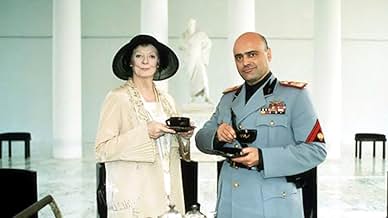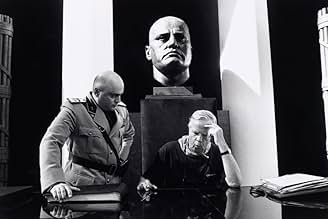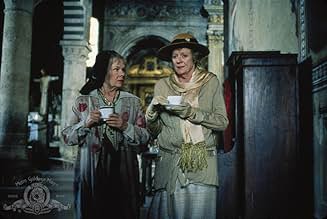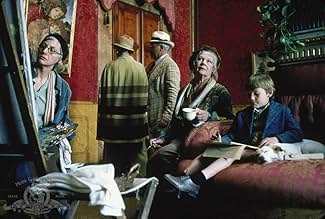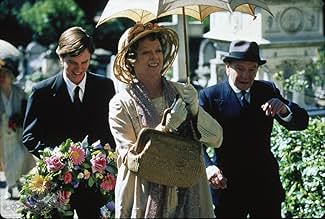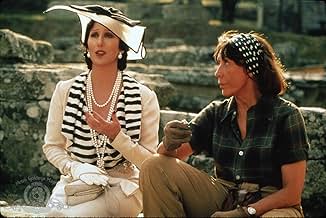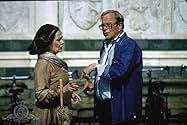NOTE IMDb
6,9/10
14 k
MA NOTE
Un jeune orphelin italien est élevé par un cercle de femmes britanniques et américaines, vivant dans l'Italie de Mussolini avant et pendant la Seconde Guerre mondiale.Un jeune orphelin italien est élevé par un cercle de femmes britanniques et américaines, vivant dans l'Italie de Mussolini avant et pendant la Seconde Guerre mondiale.Un jeune orphelin italien est élevé par un cercle de femmes britanniques et américaines, vivant dans l'Italie de Mussolini avant et pendant la Seconde Guerre mondiale.
- Victoire aux 1 BAFTA Award
- 5 victoires et 3 nominations au total
Histoire
Le saviez-vous
- AnecdotesCher has stated that the only reason she took the part of Elsa was because Writer and Director Franco Zeffirelli said he could only see her and no other actress in the role.
- GaffesThe tanks the Germans ride in are, in fact, U.S. Army M4 Shermans, not German-built Panzers.
- Citations
Lady Hester: The Germans and the Italians couldn't get rid of us. There is absolutely no reason why we should surrender to the Scots.
- Versions alternativesThe MGM DVD, ISBN 0-7928-4300-2, is missing least one shot: The original tea with Mussolini scene ends with Mussolini forcing himself upon the reporter, forcing her onto his desk (i.e., he rapes her.) This DVD omits that ending and leaves the reporter's change in behavior unexplained.
- Bandes originalesMattinata Fiorentina
Written by Giovanni D'Anzi (as D'Anzi) and Michele Galdieri (as Galdieri)
Performed by Alberto Rabagliati
Commentaire à la une
It's certainly not clear how fictionalized a version of Zeffirelli's autobiography "Tea With Mussolini" is, what with the usual disclaimers at the end. Even presuming this is just a riff off an incident in his life, that he had some contact with memorable English ladies, it's clearly his tribute to where his love of English literature comes from, particularly Shakespeare. He's done several Shakespeare interpretations-- movies, opera and play directing. The film has a lovely scene of him being first introduced to acting out "Romeo & Juliet" with puppets, as well as constant quotes from Shakespeare throughout about war and his situation.
I was surprised how good the movie was - I was in tears several times, especially with visuals that bring up the same comparisons as "The Train" did, with art vs. war, humanity's heights of creativity vs. its lows of prejudice and violence.
These Oscar-winning ladies are absolutely terrific, yes including Cher. One elderly gentleman behind me complained that Maggie Smith basically always plays the same character but I thought her character does change towards the end. The others were certainly not their usual on-screen personas, Judi Dench as a free-spirited artist, Joan Plowright as a quite warm-hearted grandmotherly type, and Lily Tomlin a hoot as a butch archaeologist.
But why choose bland Italian actors for them to play off of? To make the Scorpioni, as they are called, stand out more? The Italians seemed stereotyped to me, Latin lover, ignorant peasants not appreciating their ancient artistic heritage.
What the movie also brought to mind is how few Italian movies have dealt with their fascist past as much as the French have been exploring their consciences of collaboration in film. Sure "Garden of Finzi Continis," "Two Women" and "Life Is Beautiful" show arrests, etc. but I don't get the sense of soul searching as to how did this happen here and could it again? Just because they didn't have Shakespeare and appreciate the treasures of the Uffizi as this film implies? (originally written 5/15/1999)
I was surprised how good the movie was - I was in tears several times, especially with visuals that bring up the same comparisons as "The Train" did, with art vs. war, humanity's heights of creativity vs. its lows of prejudice and violence.
These Oscar-winning ladies are absolutely terrific, yes including Cher. One elderly gentleman behind me complained that Maggie Smith basically always plays the same character but I thought her character does change towards the end. The others were certainly not their usual on-screen personas, Judi Dench as a free-spirited artist, Joan Plowright as a quite warm-hearted grandmotherly type, and Lily Tomlin a hoot as a butch archaeologist.
But why choose bland Italian actors for them to play off of? To make the Scorpioni, as they are called, stand out more? The Italians seemed stereotyped to me, Latin lover, ignorant peasants not appreciating their ancient artistic heritage.
What the movie also brought to mind is how few Italian movies have dealt with their fascist past as much as the French have been exploring their consciences of collaboration in film. Sure "Garden of Finzi Continis," "Two Women" and "Life Is Beautiful" show arrests, etc. but I don't get the sense of soul searching as to how did this happen here and could it again? Just because they didn't have Shakespeare and appreciate the treasures of the Uffizi as this film implies? (originally written 5/15/1999)
Meilleurs choix
Connectez-vous pour évaluer et suivre la liste de favoris afin de recevoir des recommandations personnalisées
- How long is Tea with Mussolini?Alimenté par Alexa
Détails
Box-office
- Budget
- 12 000 000 $US (estimé)
- Montant brut aux États-Unis et au Canada
- 14 401 563 $US
- Week-end de sortie aux États-Unis et au Canada
- 1 633 183 $US
- 16 mai 1999
- Montant brut mondial
- 14 401 563 $US
- Durée1 heure 57 minutes
- Couleur
- Mixage
- Rapport de forme
- 1.85 : 1
Contribuer à cette page
Suggérer une modification ou ajouter du contenu manquant

Lacune principale
By what name was Un thé avec Mussolini (1999) officially released in India in English?
Répondre

